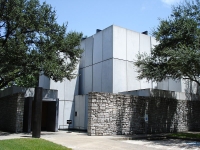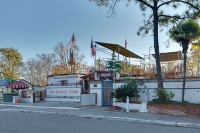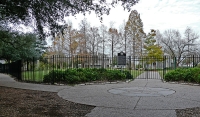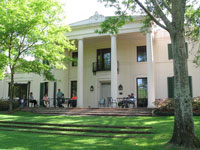City guides


Houston Travel Guide
The massive metropolis of Houston is almost twice the size of the entire state of Rhode Island. Even with this heavy urban concentration, Houston is green and lush, situated at the end of a belt of forest coming down from the North and characterized by marshlands and bayous lined with cypress trees in the southern reaches.
Houston, named after former Republic of Texas president Sam Houston, is hot and humid. To make life more bearable in the close-packed downtown area, much activity has gone underground. The city centre sports an air-conditioned seven-mile pedestrian tunnel system full of restaurants and shops. Unlike most cities, downtown Houston is the hub of residential development, so it remains busy and bustling long after dark.
Texas' largest city is not generally a sought after tourist destination, being concerned more with business than pleasure and leisure. Computer manufacture, gas and oil, and a huge concentration of medical institutions account for most of the economic activity.
But all the hard-working citizens have to play sometimes, and there are some good attractions such as excellent museums, the amazing Astrodome sports pavilion, some wonderful theatres, and, thanks to the cosmopolitan mix of its residents, some ethnically diverse cuisine on offer in its many restaurants. For visitors, the absolute must-see in Houston is the famed Space Center, mission control for the US space program.
Things to do in Houston
The largest city in Texas offers visitors plenty to see and do, making it the perfect destination for a short holiday or weekend away. Visitors should get hold of the Houston CityPass, which is valid for nine days and allows free admission to seven of the city's attractions.
Culture lovers will enjoy the Museum District, which features 19 varied and interesting museums as well as numerous restaurants in this leafy green area. And while in the area, travellers should visit the Miller Outdoor Theater to see what's on, check out the animals at the Houston Zoo or play a round of golf on the Hermann Park Golf Course.
For something completely unique, visitors should check out the quirky Orange Show, a celebration of folk art. Science lovers can make a pilgrimage to the Lyndon B Johnson Space Center in Clear Lake to view the actual Apollo and Mercury launch vehicles and even check out the space flight simulators.
Lyndon B. Johnson Space Center
The Houston Space Center is attached to NASA's mission control, the headquarters which guided pioneering astronauts and directed the space shuttle project. Houston's most popular tourist attraction, the center is located on Clear Lake off the Gulf Freeway I-45. Visitors will encounter wonders that both entertain and educate, including hundreds of hands-on displays, the largest 4K theatre in Texas and even a rare chance of seeing astronauts train. Guests can get an idea of what it's like to carry out everyday tasks in a low-gravity environment, and there is even an opportunity for visitors to practice some basic astronaut skills on simulators, such as landing the orbiter.

Museum District
The Museum District in Houston features 19 museums and galleries, set within a 1.5 mile (2.4 km) of the striking Mecom Fountain. The Museum of Fine Art and the Contemporary Arts Museum Houston are great spots to start, as is the Rothko Chapel which itself is part of the famed Menil Collection. This is perhaps best followed by the Children's Museum to lighten the mood, while kids and adults alike will love the Museum of Natural Science, the Health Museum and the Houston Zoo. There is also the Buffalo Soldiers National Museum and the Houston Museum of African American Culture, among many others.

The Orange Show
For a touch of the bizarre visit The Orange Show, a lot where a postman's obsession with his favourite fruit became a treasured local art space. Its labyrinth of orange passages and staircases has inspired Houston movements such as the popular Art Car Parade and the Beer Can House, while the mosaics of Smither Park followed its quirky aesthetics and philosophies. The park is billed as Houston's first folk-inspired green space, even hosting personal ceremonies such as weddings. Public performances and shows are also regular occurrences.

Sam Houston Park
Sam Houston Park provides visitors with a larger than life look into the area's history. Nineteen acres in size, it features seven of the oldest buildings, now fully restored and relocated to this convenient central location. A small log cabin named the Old Place dates all the way back to 1823, while others were built throughout the 19th and 20th centuries. Many of the buildings entrance travellers with the weight of time and history, while others are simply wonderful structures such as the St John Church and the Pilot House. The park itself was bought by the mayor in 1900 and landscaped into a gorgeous Victorian garden, with several permanent sculptures and memorials.

Bayou Bend
The magnificent pink mansion in the marshy elbow of Buffalo Bayou in Houston's River Oaks area was the home of Miss Ima Hogg. Miss Hogg and her two brothers bought the woodlands estate in 1925 and for two years, Miss Hogg worked on the gardens. At her death, she left her home and gardens as a legacy for the city. The gardens were the first 100 percent organic gardens in the state of Texas, with dedicated teams working to preserve and enhance them. The house contains a remarkable collection of Americana dating from 1620 to 1870 and is regarded as a cultural treasure, with several thousand objects displayed in 28 period room settings in the mansion.
National Museum of Funeral History
At Barren Springs in Houston is an unusual private museum dedicated to funeral memorabilia, perhaps the biggest of its kind in the world. Customs, rituals, and traditions associated with burial from ancient Egypt to the present day are represented, with some highlights of the collection being restored horse-drawn and vintage automobile hearses, and a unique 1916 Packard funeral bus. The museum also features a gallery devoted to the funerals of famous figures such as Elvis Presley, John F. Kennedy and Rudolph Valentino. Permanent exhibits focus on embalming, presidential funerals, mourning customs, Ghanaian and Japanese funerals, the Tomb of the Unknown Soldier and other intriguing displays.
Eating Out
The ample girth of the average Texan testifies to the good eating on offer in the Lone Star state. Known as the dining capital of the United States, Houston just about edges out Dallas in the battle for best regional dining scene and is home to some truly excellent restaurants.
The best advice for newcomers to Houston is probably to try its barbecue and Tex-Mex offerings. Served at places such as Vic and Anthony's Steakhouse and El Tiempo Cantina, these two flavours keep visitors returning for more. El Tiempo Cantina, a lively restaurant that has been serving Houston locals and visitors with fajitas and margaritas since 1997 is an obvious favourite for many.
Visitors rarely go hungry when in Houston, as there's generally something for everyone in this city that caters to many tastes and varied spending powers.
Shopping
In Houston, the malls and credit card bills are supersised so visitors should be careful when embarking on a shopping spree. Houston's most famous shopping zone is undoubtedly the Galleria, the seventh largest retail complex in the USA. It hosts high-end stores and all the big names in fashion.
At Uptown Park visitors can enjoy the atmosphere of a quaint European village as they stroll from store to store. In Kirby District travellers can find the Village, an affluent 16-block shopping zone with plenty of boutiques, galleries and spas. On weekends visitors shouldn't miss the Trader's Village, an enormous flea market with everything from jewellery and clothing to tools and old Texas number plates. It's a great place to find a really unique memento of a visit to Houston.
For Western gear, the ideal souvenir from Houston, visitors should look no further than Pinto Ranch, which stocks belt buckles, boots, saddles, and even ten-gallon hats. A bottle of Texas' finest barbecue sauce is worth taking home as well.
Nightlife
Houston's nightlife is focused on Downtown near Montrose, the Midtown area, and in the Uptown area around the Galleria. It is one of the very few American cities to have resident performance companies in symphony, ballet, opera, and theatre.
The main Downtown venues are Jones Hall, the Alley Theatre, and the Wortham Theater Center. In terms of modern music, Houston does have venues for live gigs but doesn't attract the cachet of musicians that nearby Austin does. The best venues are The Big Easy, which has a great blues lineup, and McGonigel's Mucky Duck for acoustic performers.
Houston has plenty of megaclubs in the city centre, great places to enjoy some Latin and hip hop music. Clubs and bars generally have a smarter dress code than many are used to so it's worth dressing up before a big night on the town.
Getting Around
Visitors to Houston are well advised to hire a car, which is relatively inexpensive and provides the quickest and most convenient way to navigate the spread-out city. There are plenty of car parks and a well-managed road system. To hire a car (for up to 90 days), a full national driver's license is required and drivers must be at least 25 years old (some companies hire cars to those aged 21 to 24 with surcharges).
Those opting for public transport will find that the METRO has it well covered with an efficient and extensive bus service, as well as a light rail line which links Downtown, Midtown, the Museum District, Hermann Park, the Texas Medical Center, and Reliant Park. Correct change is required for on-board bus fare boxes, or purchase tokens or a day pass in advance from local stores sporting the Metro sign. Taxis are a rather expensive option, though readily available downtown; ride-hailing apps such as Uber and Lyft are also options.
Houston Climate and Weather
Houston has a humid subtropical climate, with prevailing winds bringing in the heat from the deserts of Mexico and moisture from the Gulf of Mexico during most of the year. Summers are swelteringly hot and humid, making air conditioning a necessity rather than a luxury. In summer (June to August) temperatures average between 73°F (23°C) and 94°F (35°C), and in winter (December to February) temperatures average between 43°F (6°C) and 66°F (19°C). Summers are characterised by afternoon thunderstorms, which bring rain most days, and sometimes tornadoes. Winters, by contrast, are cool and temperate, with no snow but some rain.
United States of America travel info
Electricity
The electrical current is 120 volts, 60Hz. Plugs are mainly the type with two flat pins, though three-pin plugs (two flat parallel pins and a rounded pin) are also widely used. European appliances without dual-voltage capabilities will require an adapter.
Language
English is the most common language spoken but Spanish is often heard in the south-western states.
Money
The official currency is the US Dollar (USD), which is divided into 100 cents. Only major banks exchange foreign currency. ATMs are widespread and credit cards are widely accepted; Apple Pay and Google Pay are very popular. Banking hours are Monday to Friday 9am to 3pm.
Tipping
A 15 percent tip is expected by taxi drivers, bartenders, hairdressers and waiters, but travellers shouldn't tip in fast-food or self-service restaurants. In expensive restaurants or for large parties, the tip should be 20 percent of the bill. It's normal to tip staff such as valets and porters in hotels; this is discretionary, although a minimum of $5 is expected. Most services are customarily tipped if the service is good.
Health
There are no specific health risks associated with travel within the USA. Medical facilities are excellent, but expensive. Only emergencies are treated without prior payment and treatment can be refused without evidence of insurance or proof of funds. Good medical insurance is essential.
Safety
Travel within the United States is generally trouble-free, though travellers should be aware that the US shares with the rest of the world an increased threat from terrorist incidents. Security has been heightened, particularly at airports. Restrictions on hand luggage apply and travellers are advised to check on the latest situation with airlines in advance. Travellers should also be alert to the dangers of car and street crime in cities and should use common sense and take basic precautions. Hurricanes are common between June and November, putting the southern USA, including the Gulf Coast and the eastern US at risk. There's a risk of wildfires in many dry areas in the US, particularly on the West Coast from March to November.
Local customs
Laws vary from state to state, including speed limit, fines and punishment. The age at which alcohol may be legally bought and consumed is 21 years.
Doing business
In such a large country, filled with so many diverse groups, business practices may differ according to each state, though rarely to any large degree. The East Coast is traditionally more formal than the West Coast, though in states such as California, dress code and conservative appearance are as common as they would be in New York. Punctuality is important throughout the country and it's considered rude to be late for a meeting. Gift-giving is uncommon as it may be construed as bribery. Appropriate titles (Mr, Mrs, Ms) are used upon introduction and until otherwise stated. Americans favour politeness and greetings of 'Hello' and 'How are you?' are often expressed with sincerity. Business hours may vary in each state, but an 8am start and 5pm finish Monday to Friday is the most common with an hour over lunch.
Status and age are not necessarily indicative of seniority, nor do they carry much weight in themselves. Those doing business in the States should be mindful of this fact; foreigners should never make assumptions about someone's position or rank. Best practice is to be respectful to all parties. That said, the US upholds a hierarchal business structure in which 'the boss' is the ultimate decision-maker. Senior leaders have the power of the last word, and can go against the grain just as easily as they can follow popular opinion. Foreigners should concentrate on winning over this individual, even if the greater group seems unsupportive. Americans value a direct style of communication. In this fast-paced, consumer culture 'time is money', and small-talk is viewed as unnecessary and wasteful. It's best for foreigners to get to the point quickly, speak about issues in a frank and open manner, and to avoid taking offence if someone questions or challenges them outright.
Duty free
Travellers to the United States who are returning residents of the country do not have to pay duty on articles purchased abroad to the value of $800 provided their stay was longer than 48 hours and their duty-free allowance was not used in the 30-day period prior. For passengers arriving from Samoa, Guam and the U.S. Virgin Islands, a duty-free allowance of $1,600 is allowed. The following items are included in this: 50 cigarettes and 10 cigars and 150 millilitres (5 fl. oz.) of alcoholic beverages or 150 millilitres (5 fl. oz.) of perfume containing alcohol. Restrictions may apply to goods from Cuba, Iran, North Korea, Burma (Myanmar), Angola, Liberia and Sudan. It is prohibited to import Cuban cigars from any country.
Travellers to the United States who are non-residents do not have to pay duty on the following items: 50 cigars or 200 cigarettes and gifts to the value of $100 provided their stay in the USA is not less than 72 hours and that the allowance has not been used in the preceding six-month period.
Prohibited items for residents and non-residents include meat or meat products, poultry, narcotics, absinthe, plants, seeds, vegetables, fruits, soil, live insects and other living plants or animal pests. Fish is prohibited unless it carries disease-free certification. Wildlife and animals or their by-products carry restrictions. Dairy products and eggs from specified countries are not allowed. Firearms and ammunition are not allowed without the necessary license and permit.
Communications
The international country dialling code for the United States is +1. Mobile networks cover most of the country, especially all urban areas; travellers can purchase local prepaid SIM cards for unlocked phones or use eSIMs if their cellular providers support it on their networks. WiFi is widely available.
Passport & Visa
It is highly recommended that travellers' passports have at least six months' validity remaining after the intended date of departure from them travel destination. A visa is required for short visits unless travellers qualify for entry under the Visa Waiver Program.
The Visa Waiver Program (VWP) enables citizens of certain countries to travel to the US for a stay of up to 90 days without a visa. Visitors under the VWP need a valid Electronic System for Travel Authorization (ESTA), which allows the US government to screen all visitors before travel. Visitors entering the country under the VWP must have a machine-readable passport (MRP) that has a barcode on the photo page. Travellers under the VWP must have passports that include biometrics if they wish to enter the country without a visa, which means that passports must contain unique personal data such as fingerprints or iris details. All passports must contain a digital photo image in order to travel visa-free. All visitors to the USA have a photograph and two fingerprints taken by an inkless scanner on arrival, including those travelling visa-free under the VWP.
As part of the Western Hemisphere Travel Initiative (WHTI), all travellers travelling between the United States and Canada, Mexico, Bermuda, and the Caribbean region are required to present a passport or other valid travel document to enter or re-enter the United States. If departing from the USA, a valid passport is required by immigration authorities. Immigration officials often apply different rules to those stated by travel agents and official sources.
Entry requirements
US citizens require passports.
UK nationals require a passport valid for duration of stay. Most passport holders can get an Electronic System for Travel Authorisation (ESTA) through the Visa Waiver Programme, which allows travel to the US for up to 90 days. The VWP includes tourism, certain types of business visit and transit to another country.
The most important requirement on entering the U.S. is providing proof of Canadian citizenship. A valid Canadian passport is the best document to prove Canadian citizenship and the right to return to Canada. However, several other documents can serve, depending on the mode of transport. Generally, Canadian citizens do not require visitor, business, transit or other visas to enter the United States from Canada, though there are some exceptions.
Passports must be valid for the period of intended stay. If visiting the US for fewer than 90 days, Australian nationals may be eligible to apply for an Electronic System for Travel Authorization (ESTA), and enter under the Visa Waiver Program (VWP).
South Africans must hold a passport valid for duration of stay. A visa is required.
Passports must be valid for duration of stay. Irish nationals can get an Electronic System for Travel Authorisation (ESTA) under the Visa Waiver Programme for entry into the United States.
Passports must be valid for duration of stay. New Zealand nationals can get an Electronic System for Travel Authorisation (ESTA) under the Visa Waiver Programme for entry into the United States.
Useful contacts
United States Tourist Office: www.usatourist.com
911 (General)Embassies / consulates in other countries
United States Embassy, London, United Kingdom: +44 20 7499 9000.
United States Embassy, Ottawa, Canada: +1 613 688 5335.
United States Embassy, Canberra, Australia: +61 2 6214 5600.
United States Embassy, Pretoria, South Africa: +27 12 431 4000.
United States Embassy, Dublin, Ireland: +353 1 668 8777.
United States Embassy, Wellington, New Zealand: +64 4 462 6000.
Embassies / consulates in United States of America
British Embassy, Washington DC: +1 202 588 6500.
Canadian Embassy, Washington DC: +1 202 682 1740.
Australian Embassy, Washington DC: +1 202 797 3000.
South African Embassy, Washington DC: +1 202 232 4400.
Irish Embassy, Washington DC: +1 202 462 3939.
New Zealand Embassy, Washington DC: +1 202 328 4800.


